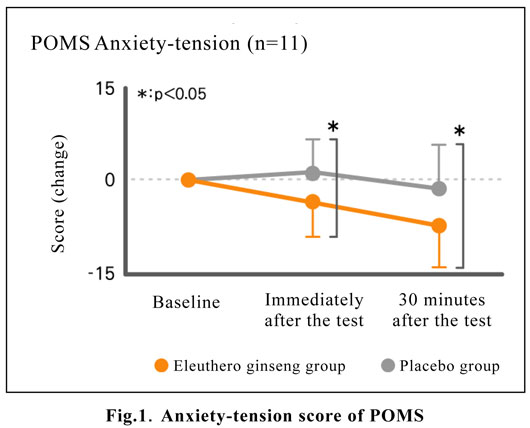- TOP
- List of reports
- Stress-Reducing Effects of Eleuthero Ginseng Extract-Containing Beverage in Humans
Stress-Reducing Effects of Eleuthero Ginseng Extract-Containing Beverage in Humans
【Scientific information】
Research and Development Department, Sun Chlorella Corporation
Stress-Reducing Effects of Eleuthero Ginseng Extract-Containing Beverage in Humans
Presented in the Japanese Journal of Health Promotion, Volume 11, Number 1 (February 2009)
Modern people are subjected to various types of stress throughout their life. Accumulated stress is thought to be a major cause of lifestyle diseases such as gastric ulcer, hypertension, and arterial sclerosis, and mental illnesses such as depression, and even to trigger sudden death or death due to overwork. Alleviating the symptoms of stress and reducing stress-caused illnesses will help those who live in a high-stress society to lead healthy lives.
- Study Objectives
- Our previous forced-swimming test in mice demonstrated the anti-fatigue/anti-stress effects of eleuthero ginseng (for details, see "Functionality of Eleuthero Ginseng Root Extract in Experimental Animals" [presented in the Journal of Japanese Society of Nutrition and Food Sciences, 2004]). In the present study, we investigated the anti-stress effects of an eleuthero ginseng-containing beverage in humans.
- Method and experiments
- Thirty-two otherwise healthy men, aged 20 to 55 years, with subjective stress were
screened and 22 subjects were selected for this study based on the results of the GHQ*1,
which psychologically assesses the level of self-awareness of daily stress. The subjects
were randomized in equal number to either a group receiving an eleuthero
ginseng-containing beverage (eleuthero ginseng group, n=11) or a group receiving a
beverage containing no eleuthero ginseng (placebo group, n=11).
Each subject consumed the assigned beverage and underwent three stress-load tests
(new Stroop test II*2, Raven's matrix test*3, and Uchida-Kraepelin test*4) at 1 hour after
intake.
In addition, the subjects completed a POMS*6 questionnaire to assess levels of physiological stress at baseline and immediately and 30 minutes after the end of the tests. The results were compared between the eleuthero ginseng and placebo groups. Saliva was collected at baseline and every 30 minutes during the tests to measure stress markers in saliva*5.
- Results
- The following effects of single intake of the eleuthero ginseng-containing beverage were observed.
- 1) The anxiety-tension score on the POMS questionnaire in the eleuthero ginseng group was significantly decreased compared with that in the placebo group (Fig. 1). This finding suggested that the effect of this beverage was more pronounced Stress-Reducing Effects of Eleuthero Ginseng Extract-Containing Beverage in Humans Presented in the Japanese Journal of Health Promotion, Volume 11, Number 1 (February 2009) in subjects with a higher level of daily subjective stress.
- 2) On the stress-load tests, the percentage of correct answers in the Raven's matrix test in the eleuthero ginseng group was significantly higher than that in the placebo group. The percentage of correct answers in the Uchida-Kraepelin test in the former group tended to be higher than that in the latter group. These findings suggest the possibility that eleuthero ginseng inhibits stress-induced impairment of cognitive function and accuracy.
- In conclusion, our findings suggest that an eleuthero ginseng-containing beverage can be expected to reduce stress in humans. Our findings also suggest that its stress-reducing effect was more pronounced in subjects with a higher level of daily subjective stress.

Terminology
- Note 1) GHQ (General Health Questionnaire 28)
- A questionnaire for measuring mental health in the previous week, which consists of four subscales: somatic symptoms, anxiety-insomnia, social dysfunction, and depression. The highest possible score on each subscale is 7 points. In this study, a total score of 6 points represented mild to moderate stress.
- Note 2) New Stroop test II
- A task involving reading color names printed in ink of non-matching colors (for example, choosing a color matching the word of "Black" printed in green ink). The task requires concentration and causes stress.
- Note 3) Raven's matrix test
- A task involving choosing one graphic matching a missing part of a standard graphic from six graphics. The task requires cognitive activity and judgment and causes stress.
- Note 4) Uchida-Kraepelin test
- Single-digit addition must be continuously performed for 15 minutes in the first half of the test, followed by a 5-minute rest, and for another 15 minutes in the last half of the test. The task requires rapid and accurate calculation and causes stress.
- Note 5) Stress markers in saliva
- Three stress markers, including cortisol, free-MHP and s-IgA, in saliva were measured. In this study, no clear differences were observed in any of these markers between the two groups.
- Note 6) POMS
- Stress symptoms are rated on six mood subscales including anxiety-tension, depression-dejection, anger-hostility, vigor, fatigue, and confusion. The score on each subscale is adjusted for gender and evaluated.
Publication
- Name of journal:
- Japanese Journal of Health Promotion, Volume 11, Number 1, 18-24, 2009
- Title:
- Stress-Reducing Effects of Eleuthero Ginseng Extract-Containing Beverage in Humans
- Authors:
- Masako Saito1, Hideo Takegoshi1, Hirofumi Chubachi2, Jyunpei Yajima3, Naomasa Okamura4, and Akira Tsuda5
- Affiliation:
- 1) Sun Chlorella Corporation, 2) Hokkaido Medicinal Plant Research Institute, 3) Department of Human Studies, Faculty of Humanities, Beppu University, 4) Cognitive and Molecular Research Institute of Brain Diseases, Kurume University, 5) Department of Psychology, Faculty of Literature, Kurume University





